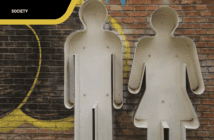By S.T. Wainaina
Valued Conversations
Human beings yearn for happiness and avoidance of suffering or pains. For those who subscribe to the
creation narrative, the Garden of Eden was a representation of a paradise on earth. The first couple
were to live in bliss, enjoying nature’s abundance provided they abided by the creator’s code of conduct.
With their needs fully catered for, they were truly living a happy life. However, the enviable state of being
was short-lived, for the curiosity, which is said to have killed the cat, took the better part of them, and
they enjoyed the forbidden fruit. As a consequence of disobedience, suffering and struggle for survival
became part of human experience. Henceforth, human civilization is catalyzed and motivated by the
desires to maximize happiness while eradicating all forms of suffering. The search for happiness is a lifelong endeavor for all humans. Ideally, happiness and suffering are mutually exclusive.
Work hard >become successful >happiness
This was the old formula of happiness: This formula summarizes the narrative we got from our
parents and the education system. In obedience, you work very hard in school, you get “As”, Distinctions,
Honors, and then PhDs. After the bachelors, you enroll for masters, then double masters, etc. In our
midst, are persons who have acquired the dubious accolades as “perennial students”, ever busy accumulating academic certificates. Ultimately, when one gathers the courage to graduate, they are disappointed to discover that the number and quality of academic certificates does not make you happier at all. Actually, you are depressed and bitter with a world that ignores your academic achievement. The invisible hand in competitive market rewards people for what they produce but not for
what they know!
When you embark on your chosen career, you put in your best efforts, as a loyal, dedicated employee
who goes beyond the normal call of duty. Promotions come your way, foreign travel and postings,
huge salary and bonuses. You are always on the move, fast lane to the C-suite. Only to realize that
you have little time to connect with your children and spouse. Spoiling your children with teddy bears, toys,
smart phones, computer games and pristine vacations is no substitute for parental emotional connection. You earn recognition, awards and praises in the corporate arena at a very high cost and there is a grave risk of losing your children.
Those who choose the entrepreneurship route, work extremely hard to nurture and grow their enterprises. Sales turnover, profitability, staff numbers, market share, among other performance parameter growth trajectory is impressive. You open new outlets, products and service menus are reviewed and enriched continuously, regional markets become part of your arena, mergers and acquisitions for faster growth
are well executed as growth strategies. With bulging bank balances, you acquire several holiday homes, private jets and helicopters, yachts, etc. However, success in business does not deliver a nirvana. Your health and relationships at the domestic and extended family level suffer a lot. You become a
busy lonely, depressed multi-millionaire or billionaire. It is not surprising that divorce rates are the order of the day among the corporate titans. The soap opera, titled, “the rich also cry”, captures the characteristic
nature of man’s pursuit of riches and power at whatever costs.
The old formula of happiness: work hard -become successfulhappy is a flop
Hard smart work may make you successful in your chosen vocation without necessarily making you a happier person. Endless accumulation of material possessions is not a pathway to a blissful life. One
characteristic of billionaires is that they never have enough. The drive for more, more and more things has no happy ending. When is more enough?
Better Way
If external artefacts and toys do not guarantee happiness, where should we search for happiness? Well, human’s internal needs cannot be satisfied by external things. We must go inside ourselves. Humans get a sense of fulfillment, satisfaction and worthiness when they engage in activities that have meaning. Humans derive happiness when they get engrossed in purposeful activities, tasks that they passionately care about and things that are aligned to their beliefs and values. When this happens, work becomes pleasurable, enjoyable and fulfilling.
The pleasure and purpose principle is a better way of explaining human behavior in pursuit of happiness. How we allocate our 24-hour days between work, sleep and pleasure depends on priorities. It is a balancing act in trying to achieve some harmony in running your life. Work without a purpose is drudgery and a killer.
Pleasure for the sake of it is a horrible enterprise. You must strike a balance. Finally, we can reframe the original happiness equation thus:
Be happy > work hard > become successful
Start by being happy with your being. Then engage in meaningful work, in fulfillment of your purpose in life and success will automatically follow. Success in its all manner of manifestations does not deliver
happiness, however, being happy with yourself and loving what you do will make you successful.
Some simple routines that can fire you to feel happy all the time include:
- Engaging in random simple acts of kindness, e.g. surrendering a seat in a public vehicle, paying grocery bills for a senior citizen, assisting an elder get into a lift, sending money to a needy student, volunteering in an orphanage.
- Cultivating a heart of gratitude for just your being. Counting your blessings opens your eyes to appreciating how lucky and privileged you are. Do not compare yourself with others.
- Moments of medication/fasting, connects you to your soul, the Superior Being.
- Exercise to keep fit. A healthy and vibrant body will serve you for many years. Wealth is useless for a sickly person on a death bed. Keeping fit does not have to be in expensive gyms, it could be as cheap as taking a brisk sundowner walk or working in your backyard garden, mopping the house, etc.
- Moments of silence – There is too much noise and distractions in the external environment. Learn to
unplug your mobile phones, internet and social media clutter. Curving moments of complete silence is the best act of self-love. - Reading interesting books. Without intellectual rigor, our brains atrophy quite fast. Reading nteresting books not only broadens your world view but also keeps you mentally alert.
- Quit the rat race of primitive accumulation of possessions and comparison with the Jonnies. In
whatever you attempt to do, there will also be a person ahead of you. Come to think about it, if you acquired all the things that you desire, where will you store/park them? Learn to be satisfied with what’s enough for your needs. Neil Pasricha, in his book, ‘Happiness Equation’ aptly summarizes this: Want Nothing + Do Anything=Have Everything. Being satisfied with enough, you desist wanting to grab the newest model of fashion. Satisfied with what you have, you are free to engage in your passion (do anything pleasurable and purposeful) and ultimately you achieve, selfrealization (have everything). Unlike self-actualization which is more external oriented (success for social recognition), self- realization is inward looking, success for self, doing things and acquiring possession for self-fulfillment.
We are responsible for our own happiness. You cannot solve all humanity’s challenges. Do not purport to shoulder others’ problems. You can extend your hand of kindness without creating codependence and irresponsible behavior in others. Engaging in meaningful work and creating time to have fun is the formula
for being happy. Happy people live longer, healthy lives. You have a choice. Choose to be happy.
I wish you a bountiful 2020. CPA S.T. Wainaina is a member of ICPAK.




